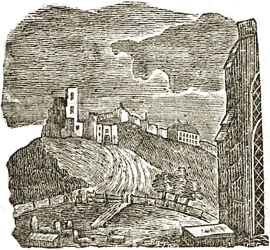|
|
|
|

A BRIEF BALLET
TOUCHING THE TRAITOROUS TAKING OF
SCARBOROUGH CASTLE *
Imprinted at London, in Fleete-strete, by Tho. Powell.
Cum privilegio ad imprimendum solum.
Oh, valiant invaders! gallantly gay;
Who, with your compeers, conquering the route,
Castles or tow'rs, all standing in your way;
Ye take, controlling all estates most stout,
Yet had it now been good to look about,
Scarborough castle to have let alone;
And take Scarborough warning everyone.
By Scarborough castle, not Scarborough
I only mean—but further, understand,
Each haven, each hold, or other harborough
That our good King and Queen do hold in hand:
As due obedience bindeth us in band
Their Scarborough castles to let alone;
And take Scarborough warnings everyone.
The scalers of which castles evermore,
In books of old, and in our eyes of new,
Have always lost themselves, and theirs therefore;
All this ye did forget in time to view,
Which might have wrought both you and yours t'eschew,
Letting Scarborough castle now alone;
Taking Scarborough warning everyone.
This Scarborough castle simply standing,
Yet could that castle slyly you beguile;
Ye thought ye took the castle at your landing,
The castle taking you in the self while:
Each stone within the castle wall did smile
That Scarborough castle ye let not alone;
And took Scarborough warning everyone.
Your putting now in ure your devilish dream,
Hath made you see (and like enough to feel)
A few false traitors cannot win a ream;
Good subjects be, and will be, true as steel
To stand with you, the end they like no deal.
Scarborough castles they can let alone;
And take Scarborough warnings everyone.
They know God's law—to 'bey their King and Queen;
Not take from them, but keep for them their own;
And give to them, when such traitors are seen,
As ye are now, to bring all overthrow.
They work your overthrow, by God's power grown.
God saith—let Scarborough castle alone;
Take Scarborough warning everyone.
Too late for you, and in time for the rest
Of your most traitorous sect (if any be);
You are all spectacles at full witnessed,
As other were to you—treason to flee,
Which in you past, yet may the rest of ye
The said Scarborough castles let alone;
And take Scarborough warnings everyone.
This term, Scarborough warning grew, (some say),
By hasty hanging, for rank robbery there.
Who that was met but suspect in that way,
Straight was he trussed up, whatever he wear.
Whereupon, thieves thinking good to forbear,
Scarborough robbing they let that alone;
And took Scarborough warning everyone.
If robbing in that way, bred hanging so,
By theft to take way, town, castle, and so,
What Scarborough hanging craveth this, lo!
Were yourselves herein judges capital,
I think your judgments on these words must fall,
Scarborough robbing, who lett'th not alone,
Scarborough hanging deserve everyone.
We would to God that you, and all of you
Had been considered, as well as ye knew
The end of all traitory, as you see it now,
Long to have lived, loving subjects true.
Alas ! your loss we not rejoice, but rue
That Scarborough castle ye let not alone;
And took Scarborough warning everyone.
To crafts that ever thrive, wise men ever cleave;
To crafts that seeld when thrive, wise men seeld when flee;
The crafts that never thrive a fool can learn to leave.
This thriftless crafty craft then clear leave we,
One God, one king, one queen, serve frank and free,
Their Scarborough castle let it alone;
Take we Scarborough warning everyone.
One sovereign lord and sovereign lady both,
Laud we our Lord, for their prosperity;
Beseeching Him for it, as it now go'th,
Continued so, in perpetuity;
We letting their Scarborough castles alone;
Taking Scarborough warnings everyone.
FINIS.
Quod. J. Heywood.
[AJ Note:]
*In 1557, Scarborough Castle was briefly taken over by the men of Thomas Stafford, who entered disguised as peasants. The castle was retaken 3 days later.
|
Source:
Farmer, John S., ed. The Proverbs, Epigrams, and Miscellanies of John Heywood.
London: Early English Drama Society, 1906. 311-314.
 | to Works of John Heywood |
Site copyright ©1996-2018 Anniina Jokinen. All rights reserved.
This page created by Anniina Jokinen on November 19, 2010. Last updated December 16, 2018.
|
|
The Tudors
King Henry VII
Elizabeth of York
King Henry VIII
Queen Catherine of Aragon
Queen Anne Boleyn
Queen Jane Seymour
Queen Anne of Cleves
Queen Catherine Howard
Queen Katherine Parr
King Edward VI
Lady Jane Grey
Queen Mary I
Queen Elizabeth I
Renaissance English Writers
Bishop John Fisher
William Tyndale
Sir Thomas More
John Heywood
Thomas Sackville
John Bale
Nicholas Udall
John Skelton
Sir Thomas Wyatt
Henry Howard
Hugh Latimer
Thomas Cranmer
Roger Ascham
Sir Thomas Hoby
John Foxe
George Gascoigne
John Lyly
Thomas Nashe
Sir Philip Sidney
Edmund Spenser
Richard Hooker
Robert Southwell
Robert Greene
George Peele
Thomas Kyd
Edward de Vere
Christopher Marlowe
Anthony Munday
Sir Walter Ralegh
Thomas Hariot
Thomas Campion
Mary Sidney Herbert
Sir John Davies
Samuel Daniel
Michael Drayton
Fulke Greville
Emilia Lanyer
William Shakespeare
Persons of Interest
Visit Encyclopedia
Historical Events
Field of the Cloth of Gold, 1520
Pilgrimage of Grace, 1536
The Babington Plot, 1586
The Spanish Armada, 1588
Elizabethan Theatre
See section
English Renaissance Drama
Images of London:
London in the time of Henry VII. MS. Roy. 16 F. ii.
London, 1510, the earliest view in print
Map of England from Saxton's Descriptio Angliae, 1579
Location Map of Elizabethan London
Plan of the Bankside, Southwark, in Shakespeare's time
Detail of Norden's Map of the Bankside, 1593
Bull and Bear Baiting Rings from the Agas Map (1569-1590, pub. 1631)
Sketch of the Swan Theatre, c. 1596
Westminster in the Seventeenth Century, by Hollar
Visscher's Panoramic View of London, 1616. COLOR
|
|